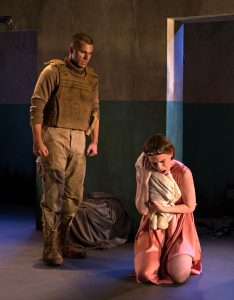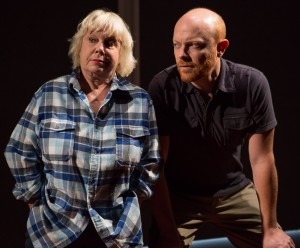Lauren Gunderson is the most successful playwright you’ve never heard of—if you are a New York theatergoer. She has topped American Theatre magazine’s annual list of most-produced playwrights in three of the last five years and ranked second in the other two, but her work is mostly done by regional theaters. Gunderson’s Emilie: La Marquise du Châtelet Defends Her Life Tonight, for example, has been staged from Maryland to Wisconsin to New Mexico to Australia since it premiered at California’s South Coast Rep in 2009, but is just now arriving Off-Broadway.
Good Friday
The New York premiere of Kristiana Rae Colón’s new play Good Friday could not have come at a more imperative time in our culture. In an age when baby boomers’ once-earnest activism (the women’s movement of the 1970s) has been replaced by millennials’ equally well-meaning, but less effective “slacktivism” (#MeToo, #YesAllWomen), what does it mean in this day and age to call oneself a feminist? And what happens when women are forced to confront their belief systems, however different, just as a crisis occurs?
Scraps
Scraps, a new work by award-winning playwright Geraldine Inoa, begins like an ancient Greek play would—with a prologue that sets the stage for the drama. In Scraps, however, a character, Jean-Baptiste (Roland Lane) raps the prologue from the stoop of an apartment building in Bedford-Stuyvesant, Brooklyn. “Allow me to be your Greek chorus,” he says to the audience, and his rhymes paint a portrait of the neighborhood in 2014, where the injustices of police violence are keenly felt. Indeed, a police officer has just shot neighborhood local Forest Winthrop, who was on the way home with diapers for his son.
When Women Burn
The visual imagery presented in The Flea's The Trojan Women strikes two seemingly disparate chords upon viewing. One is of The Rape of the Sabine Women, an ancient Roman story about soldiers who arrived on the shores of Italy. The men abducted and otherwise ravished a group of Sabine women. Another image, more overt (and one we are asked to leave the theater with), is the violent uprooting of millions of Syrian refugees from their homes. As Hecuba, Helen, Andromache and Cassandra bitterly mourn their fallen city, we cannot help but think of their lives in a foreign, hostile country, as they are carried off in boats that are almost as precarious as their hollow futures.

This resonance, sometimes obvious and sometimes thrillingly unspoken, is the beating heart of this drama, written by the silver-tongued Ellen McLaughlin. Enveloping this drama, which has survived well past its antiquarian origins, is the tragic, antediluvian helplessness of postwar women at the hands of their conquerors. It is the human tension of the play, with its mostly female cast, that rings through McLaughlin's words and lifts the story into beautiful, complex territories. Directed by Anne Cecelia Haney and under the much-lauded artistic directorship of Niegel Smith, this adaptation of Euripides' antebellum narrative, if occasionally flighty, is moving and cinematic in its scope.
The play begins with the drugged monotone of waves crashing against a beach, as we are welcomed into The Flea's downstairs theater. It seats perhaps forty—the intimacy of the space threatens our bubble of suspended disbelief. As if painted onto the wall, a turbaned, blindfolded woman sits, waiting. On the floor lie some six women—this is the Chorus—curled up and covered in grey blankets. The music of the sea gradually bestirs the blindfolded woman, and from her commanding voice and gait, we gather that she is Hecuba (played by a marvelous DeAnna Supplee), former queen of Troy and war prize for the Greeks. The women of Troy have been captured by their enemies the Greeks following the sack of Troy, and are waiting to be shipped off to kings' courts as slaves, concubines or second wives—harder luck perhaps than their Sabine ancestors. Cassandra (a powerful Lindsley Howard) and Andromache (Casey Wortmann, wonderful) are among the most haunted: the former has been 'made mad' by the god Apollo for spurning his love, and the latter is the widow of Hector, a fallen Trojan prince. All are violently helpless and burning with war trauma, with nothing to do but wait.
Haney has expertly interpreted McLaughlin's words, which retain most of the flair and poetry of Euripides' original. As the Trojan women dream of their future lives, they repeat stories of far off countries: "If you wash your hair in their rivers," one of them says, "they come out gold." Haney builds particular emphasis around this optimism, for it is mirrored in the current refugee crisis that has shaken the world with its sorrow. Here is where McLaughlin, who first adapted the story with the Bosnian war and its aftermath in mind, becomes fickle: the plot is held together by the barest of backbones, and for all the characters' elegies and monologues, there are times when the postwar narrative seems too forced, too distant. But when we are reminded, it is powerful: doctors, engineers and artists leave behind their burning cities for lives as taxi drivers, postmen and even unemployment, just as Hecuba, Andromache, and their once regal companions become less than their former selves. They resign themselves to lives of physical and emotional imprisonment.
Hecuba embodies all the nostalgia, mad sorrow and pride of her fallen Trojan citizens. Supplee delivers the fallen queen's lines with wounded ferocity; even when she whispers, there is weight and regality behind it. Tears shine perpetually in Hecuba's eyes—her only equal is Helen (Rebeca Rad), played with a great deal more pathos and wit than the original character is intended to have. In the 1971 film, starring the luminescent Vanessa Redgrave and Katharine Hepburn as Andromache and Hecuba respectively, Helen is a teasing, dangerous, one-dimensional male fantasy (both ancient playwright and seventies era director were male, after all). Rad anneals this fantasy with humanity; her lines are the most moving ones McLaughlin has written in the play.
The entrance of a male soldier, Talthybius (Phil Feldman) towards the end spins the play into a climax. Suffice it to say, he is dressed in combat gear and bears bad news for the women, just as they have seemingly reconciled themselves to their futures. In happier moments, the play has spontaneous moments of song and dance, welcome augmentations to the narrative. Lighting and sound design (Scot Gianelli and Ben Vigus respectively) are both characters of their own, booming and crackling with emotion as the play progresses. Both are also responsible for the cinematic sweep of the concluding scenes, perhaps some of the best minutes of The Trojan Women. Come for the nostalgia and the instructive, present performances, but stay for those dying moments.
The Trojan Women runs through Sept. 26. Performances are Thursday through Saturday at 9 p.m. and Sunday at 3 p.m. Tickets are $15-$20 with the lowest priced tickets available on a first-come, first-served basis. The Flea Theater is located at 41 White St. between Church St. and Broadway. Purchase tickets by calling 212-352-3101 or visit theflea.org.
Finding True Joy
Sex, drugs, alcohol and money does not bring contentment to New York City lawyers, but it is still entertaining to watch the lawyers search for inner peace. Ethan McSweeny directs an accomplished ensemble in Thomas Bradshaw’s Fulfillment. Set in present-day Manhattan, the play covers ridiculous housing challenges and various pathways to self-satisfaction that resonate with New Yorkers.
The play's protagonist is a 40-year-old black lawyer named Michael (Gbenga Akinnagbe), who has worked 80 hours a week for the past nine years at a law firm with the same title of senior associate. Although Michael's colleague Steven started at the law firm the same time as Michael, Steven has been promoted to partner and makes $800,000 a year. Michael’s white, office hookup-turned girlfriend Sarah (Susannah Flood) claims that Michael has not been promoted to partner because of racism. She says, “Just think about it. No women partners, no black partners. I’m telling you this because we’re two of the only people from under-represented groups working here. We need to stick together.”
Whenever Michael’s white boss Mark (Peter McCabe) has a new, black client, Mark “trot[s] [Michael] out like a show horse!” Mark claims that Michael has not been made partner because Michael has a drinking problem. Mark offers to have the firm pay for Michael to go to rehab, but Michael does not want to be away from work for that long. Michael also just bought a “shoebox in Soho” to live in for $1.5 million and had to borrow $80,000 from his mother’s retirement to help cover the down payment. Sarah says that Michael should instead “be living in a five million dollar apartment.”
This play’s message about happiness not being found in external things is communicated well. The value of this production is demonstrated in how this message is shown through the breakdown of Michael’s life. Audiences witness how Michael’s alcohol dependency feeds his insecurities and ultimately sabotages everything Michael has been trying to create for himself. New York City theatergoers will also easily relate with the intolerable amount of noise from Michael’s upstairs neighbor Ted (Jeff Biehl). The situation only escalates when Michael complains to the president of his condo association Bob (Denny Dillon).
As a grown man, Michael appears naive and boyish and easily manipulated by others. His own identity and sense of self-worth are questionable. Akinnagbe conveys Michael’s innocence eloquently and this allows for audiences to eventually develop compassion for Michael’s struggle. It also softens the cold, robotic, conniving exterior behavior of the other characters. Audiences begin to understand the roots of Michael’s alcoholism when Sarah says, “It’s only natural that you have no idea how to deal with people. You stopped maturing emotionally the second you started to drink [alcohol].” Michael started drinking when he was 16 years old.
As the characters seek fulfillment in their own lives, theatergoers may start to wonder if this production achieves what it set out to accomplish. Even with stellar performances like McCabe perfectly nailing his portrayal of Michael’s boss, the production seems like it is still in its adolescent stages. The material is fresh, quick and current but feels underdeveloped. The scenes tend to be short and end too prematurely for audience members to get the full emotional impact. The creative transitions between the scenes are flawless due to the lighting by Brian Sidney Bembridge and sound by Mikhail Fiksel and Miles Polaski. However, the multiple transitions become disruptive and lose their originality after a while. At times, the production relies on engaging audiences by using intense sexual scenes with masturbation, S&M and full-frontal nudity. Sex choreographer Yehuda Duenyas creates very realistic sexual scenes and it is like sitting on the set of a pornographic film.
Fulfillment does capture modern life in New York City and creates a greater conversation around what motivates and drives people. At the same time, Bradshaw could have focused more on universal, redeeming qualities. This would add depth to the production’s message and allow for audiences to empathize with the characters’ vulnerabilities. McSweeny could also achieve this through directing the actors to have more emotional range in their performances.
The overall aim of this production falls short, and the production’s message has so much potential to mature and could even be further developed. Despite these weaknesses, the cast is superb and well worth seeing in this production. The Flea Theater has produced award-winning Off-Off-Broadway productions and is known for showcasing current and original material. For those seeking a captivating glimpse into the life of an alcoholic lawyer in New York City who has not come to terms with his alcoholism, then see Fulfillment.
Thomas Bradshaw's Fulfillment runs until Oct. 19 at The Flea Theater (41 White St. between Church St. and Broadway) in Manhattan. Evening performances are Wednesday–Monday at 7 p.m. and matinee performances are Sunday at 3 p.m. Tickets are $35, $55, $75 and $105 and can be purchased by calling 212-352-3101 or visiting www.theflea.org.











